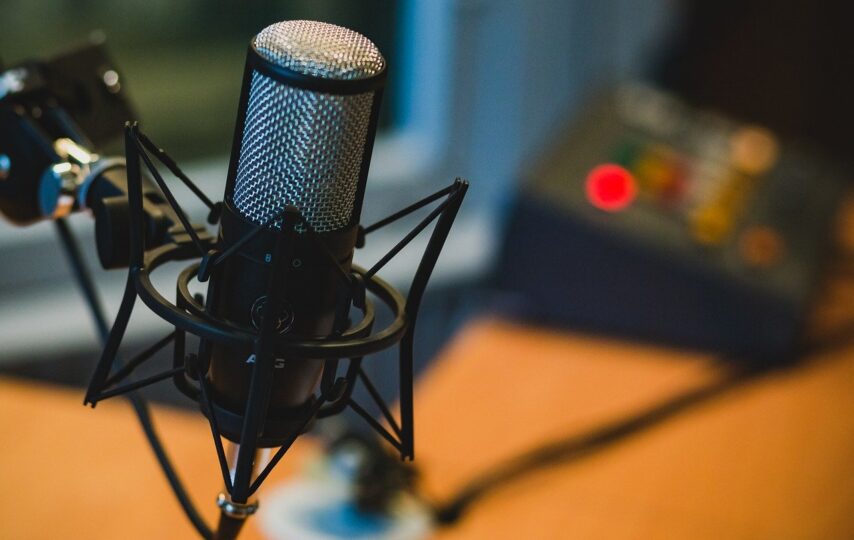Listeners are extremely active, which is the ultimate buzzword of social media marketing. Unlike social videos, such as Facebook in-feed videos, which have an average watch time of 16.7 seconds, podcast listeners stick with it, with 80% of them finishing all of the episodes they start, week after week.
When they’re at home or in their car, they’re more likely to be listening, which means they have their attention open and concentrated on the content at hand (or ear). When scrolling through a newsfeed or website, there isn’t a flood of colorful advertising vying for attention in their peripherals as there is when scrolling through a newsfeed or website.
For the past 8 years, I’ve been using the power of podcasting, and if you want to do the same, use these tips to get started.
1. Think about why you’re doing what you’re doing.
There are a lot of things you can do with your podcast, and figuring out what you want to do with it before you start is crucial. Your reason for starting a podcast should inform the content you share while making it, whether you’re looking to increase your influence, one piece filler arcs grow your company, or grow your audience.
If your motivation is to make money by podcasting, know that it’s not impossible— it’s just a tall order, and you’ll need to be willing to commit a significant amount of time and effort to your show in order to succeed.
2. Be Honest—Are You Consistent?
You should aim to release a new podcast every week. With so much content available online, if you don’t post on a regular basis, you’re deliberately losing relevance.
Is it possible for you to make a calendar that you can stick to? What does it resemble? How much time will you need to log, edit (if necessary), and syndicate? Which day of the week do you have the freest time to post?
Make that your syndication day every week, and stick to it. Then, if you’re able to make more, go for it!
3. Identifying Your Specialization
Your audience won’t know what to expect from your podcasts if your content isn’t centered, and they won’t know why they should listen to you. Although it can be difficult to refrain from talking about anything and everything, maintaining concentration for your show is critical to its success.
Consider your perfect listener and what you can give them—what do you speak about that excites you right away? Begin there and refine your concept until you find a true theme. Look at what’s new on iTunes to get ideas for your niche and content.
4. The Importance of Your Name
Your podcast’s title should represent your personality and give listeners an idea of the types of topics you’ll be discussing. My podcast’s name is Think Tank Tuesday, which gives listeners an idea of when they should expect to hear me and also means that the material will be educational.
When you’ve found a title you like, look it up on podcast platforms to make sure it’s not already in use and that there aren’t any others that sound too close.
5. Intros and Outros Are Essential
Although you shouldn’t stick too closely to a script or guideline when documenting your show’s material, it’s always a good idea to map out your intros and outros so you don’t miss any important information. They can function as a strand of continuity that connects each episode.
A brief synopsis of what to expect, a brief personal introduction, and a preview for what’s to come should all be included in your intros and outros.
Most importantly, your outro should include a reminder to like, comment, share, or subscribe to your content; this is how your audience can expand.
6. Develop High-Quality Thumbnails
Since your podcast is completely audio, the only place where you can try to visually reach potential listeners is in the show thumbnail. It’s what will make your podcast identifiable, even though it never appears larger than a postage stamp online.
Since podcast thumbnails are often posted small, don’t try to include tiny copy or symbols—they’ll be illegible and waste room.
7. Invest in the Right Equipment
Since you can’t rely on your good looks when it comes to audio material, it’s important to give your listeners a good listening experience. This necessitates the use of appropriate equipment.
A microphone, phone stand, amplifier, USB box, headphones, and a large mixer if you intend on recording with guests on a separate mic are all appropriate equipment for creating your podcast.
About half a million podcasts are currently active
When it comes to microphones, the Heil Sound PR40 Dynamic Microphone comes highly recommended. It has a fantastic sound and doesn’t pick up any external noise from where you’re recording— plus, it’s gold. When it comes to stands, you’ll want one that’s both stable and compatible with the mic mount you choose. This one is for the Heil PR40 microphone.
When recording, your audio levels are crucial; Joemeek makes a high-quality compressor that’s simple to use for those who are just getting started, and finally, your headphones should be as intense as your desire to produce a great podcast. I recommend investing in a pair of professional Sony headphones for this— understanding how you’ll look to your audience is crucial.
8. Make Use of The Correct Software
Look no further than Adobe Audition when it comes to podcasting apps. You’ll be able to record audio, mix music, create your own sound effects, and much more all from one platform. You can also improve the quality of audio that you’ve already captured.
9. Decide on a format.
If it deviates from the format from time to time or not, every show has one. You must decide on your style, such as whether you will conduct interviews on a daily basis, take guest calls, or keep it personal. There are a million different ways to structure your show; all you have to do is think about what works best for you.
For example, if you’re not a natural conversationalist or have trouble sticking to deadlines, using an interview format might be challenging because you’ll have to keep a new person involved every episode while still identifying and scheduling talent to interview.
10. Put It On The Market
Before you syndicate your first podcast, consider posting it on social media first. Although you may be hesitant to share content you’ve built with a private audience, your friends and family may have experiences you’ve missed that will help you take your cast to the next stage. Visit mountas.com for more tips and guides on vlogging.



